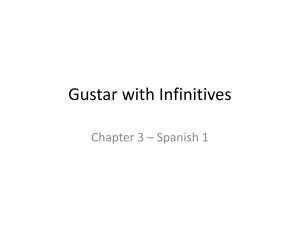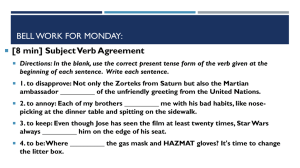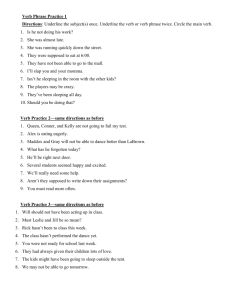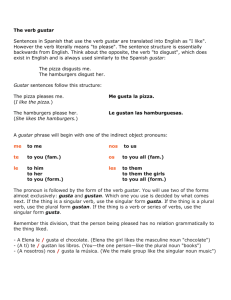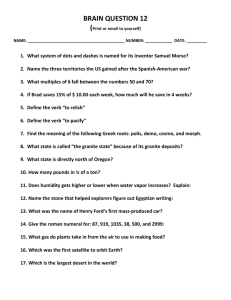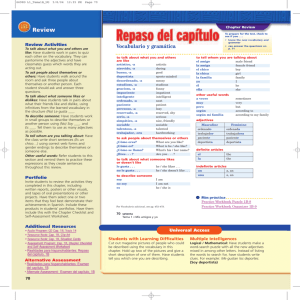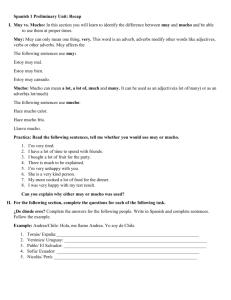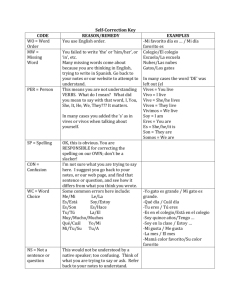Google Voice Findings - Liberty Union High School District
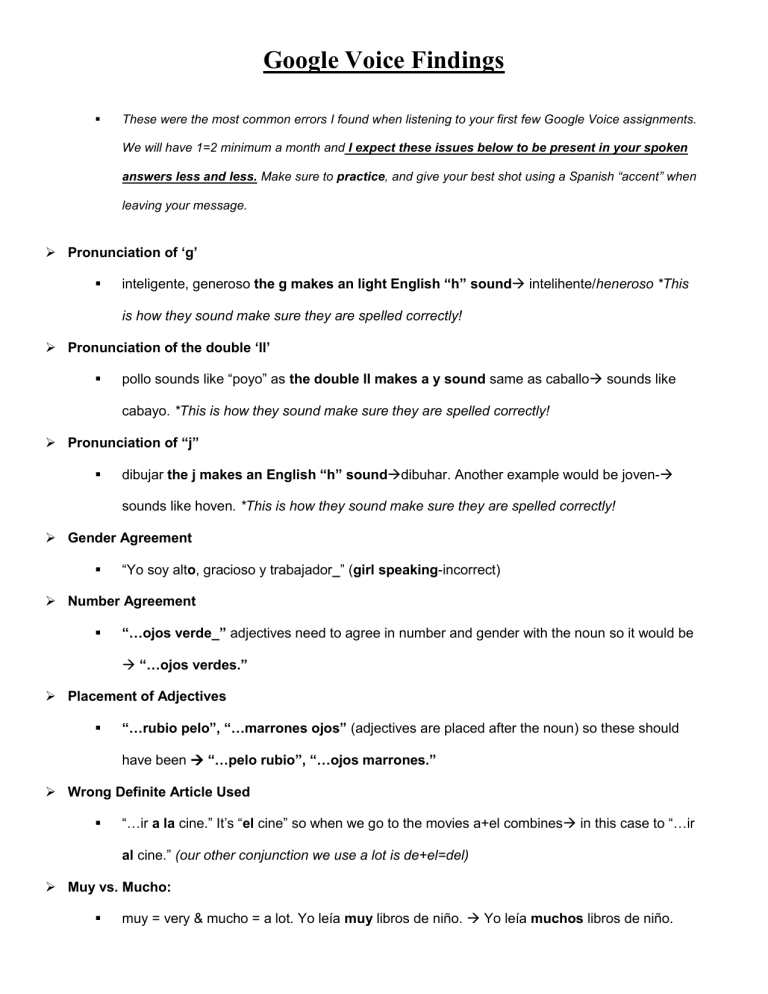
Google Voice Findings
These were the most common errors I found when listening to your first few Google Voice assignments.
We will have 1=2 minimum a month and I expect these issues below to be present in your spoken
answers less and less. Make sure to practice , and give your best shot using a Spanish “accent” when leaving your message.
Pronunciation of ‘g’
inteligente, generoso the g makes an light English “h” sound intelihente/ heneroso *This is how they sound make sure they are spelled correctly!
Pronunciation of the double ‘ll’
pollo sounds like “poyo” as the double ll makes a y sound same as caballo sounds like cabayo. *This is how they sound make sure they are spelled correctly!
Pronunciation of “j”
dibujar the j makes an English “h” sound dibuhar. Another example would be joven sounds like hoven . *This is how they sound make sure they are spelled correctly!
Gender Agreement
“Yo soy alt o , gracioso y trabajador _ ” ( girl speaking -incorrect)
Number Agreement
“…ojos verde_” adjectives need to agree in number and gender with the noun so it would be
“…ojos verdes.”
Placement of Adjectives
“…rubio pelo”, “…marrones ojos” (adjectives are placed after the noun) so these should have been “…pelo rubio”, “…ojos marrones.”
Wrong Definite Article Used
“…ir a la cine.” It’s “ el cine” so when we go to the movies a+el combines in this case to “…ir al cine.” (our other conjunction we use a lot is de+el=del)
Muy vs. Mucho:
muy
= very & mucho = a lot. Yo leía muy libros de niño. Yo leía muchos libros de niño.
Fuimos a Disneylandia muy veces. Fuimos a Disneylandia muchas veces.
Word Meaning There are some words in Spanish that have multiple meanings and we need to watch out for which word we choose.
“dulce”=sweet (like candy) not a person “Yo soy dulce.” This wouldn’t work
“jugo” (juice) not the “yo” form of the verb jugar “Yo jugo softbol.” This doesn’t work either
“corto” short (hair or yo form of cortar (to cut)). “Yo soy muy corto.” Corto should be replaced with bajo in this sentence which means short in terms of height. “Yo soy bajo.”
Conjugating Verbs!
You must have at least one conjugated verb in every sentence. “Yo limpiar mi cuarto y lavar los platos.” This is incorrect as the verbs need to be conjugated to the yo form. “Yo limpio mi cuarto y lavo los platos.”
Once you have conjugated your verb you no longer need the infinitive (hence why we conjugate in the first place) . For example “Yo ir voy al cine.” This should have simply been
“Yo voy al cince.” This is because “voy” is the conjugated yo form of the verb “ir” so you don’t use both.
Verb/Subject Agreement & Correct Conjugation
“…y yo lav a los platos.” Should be “…y yo lav o los platos.”
Ten aba una tortuga de niña. Ten ía una tortuga de niña. (Make sure you are using the correct FORM when you conjugate! Tener is an ‘er’ verb in the imperfect “aba” is for ‘ar’ verbs.
Estar vs. Ser
“ Estoy muy impaciente.” Estoy doesn’t describe permanent characteristics like ser does, in this case it would have been “Yo soy muy impaciente.
“Yo estoy alto, atlético y generoso.”-all of these you would use with ser. “Yo soy alto, atlético y generoso.”
No estaba gracioso. No era gracioso. (imperfect tense)
Using Gustar w/ Another Verb
“Me gusta juego softbol.” gusta and juego are both conjugated in this example which is incorrect, when you use the verb gustar with just one other verb you do not conjugate that
second verb, the verb that follows “gusta” or “gustan” is always in it’s simple form (the infinitive). The correct sentence would be “Me gusta jugar softbol.”
Gustar + plural noun: When the noun is plural make sure you pluralize gustar.
Me gustaba _ las muñecas Me gustaba n las muñecas .
Using Reflexive Verbs Correctly
“Yo me lavo los platos en casa.” We use the reflexive pronouns with reflexive verbs when we are DOING the action to ourselves (washing our own hair/brushing our own teeth/putting on our own clothes). However when the thing you are washing etc. (in this sentence-the dishes) you do NOT need to use a reflexive pronoun. “ Yo lavo los platos en casa.”
Placing an Emphasis (spoken stress) on the wrong syllable
“Salgo con mi nov í a” There is no written accent on the “i” in nov i a (girlfriend/novio=boyfriend) but if spoken with a stress on the “i” it’s incorrect.
Spoken Accent
Most everyone needs to practice their accent-this can be done by listening to native speakers and trying to “imitate” how they sound. One way is through music (find a singer/group) that you like and download some songs AND print out/save the lyrics (in Spanish) to that song so that you can sing along. Singing along with songs you like will GREATLY improve your accent, by no less than 75% if not more, as it allows you to listen and imitate which is what we do when learning any language. It will also in turn improve your understanding and expand your vocabulary.


